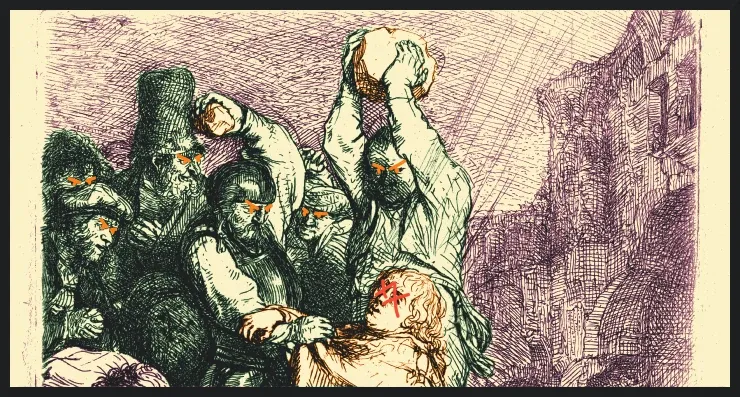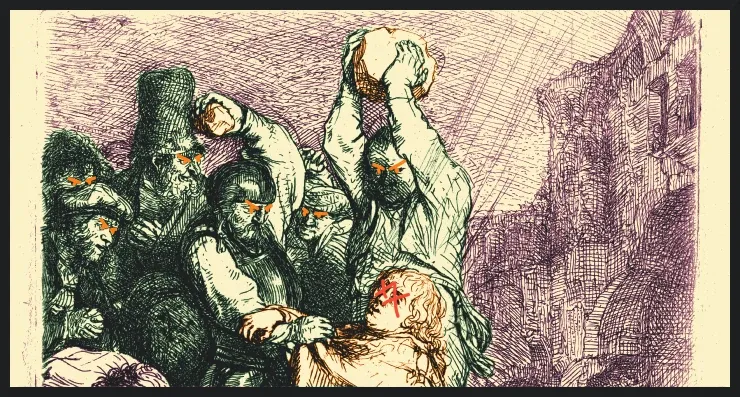SMOOSH JUICE
Kill Clerics, Become Warlocks


Why divine magic ought to feel dangerous, transactional, and one-of-a-kind.
I’m not a big fan of rigid class systems, though I still run them now and then. Of all the classes, the cleric strikes me as the dullest—so let’s fix that.
What’s the Problem?
Clerics have been baked into Dungeons & Dragons from the start: mail‑clad holy warriors who can’t swing a sword for some reason, pray once at dawn, and prep a Vancian buffet of spells.
On paper they’re versatile—an exceptional player in a great group can exploit that toolbox by planning ahead. In practice I see the band‑aid cleric: heal, heal, maybe a smiting spell if they feel spicy. Temples churn out interchangeable casters whose only distinction is the holy symbol stamped on their shield.
It’s not entirely the cleric’s fault. If choosing a god is just window dressing and every cleric still accesses the same spell list, what’s the point?
Divine magic deserves better.
Make It More Interesting
Trad D&D stumbled onto a great world‑building tool when it introduced warlocks and their pacts; clerics should work the same way.
Picture the gods as fickle, jealous Olympians. Each wants a single mortal champion—a living conduit—and grants power through a pact, not a prayer list. That champion is rare; when they die the seat stays vacant until the deity notices (or someone else seizes it).
- One Pariah of Zeus channels thunder.
- One Bearer of Athena’s Aegis projects an impenetrable shield.
- One Hand of Hades commands the lingering dead.
No duplicates, no generic “cleric spell list”. Powers are bespoke, weird, and inseparable from the deity’s personality.
Becoming a champion must matter. Perhaps a hero performed a great deed for Zeus, a death‑cult ritual won Hades’s favor, or someone struck a midnight bargain with Athena. Embed the path to patronage in your setting so players can discover—or stumble into—it.
Consequences at the Table
- Scarcity breeds drama. Killing or dethroning a champion shakes the setting.
- Unique abilities. No second character ever wields the same gifts.
- Deed‑based advancement. Miracles arrive when the champion pleases—or betrays—the patron.
- Faith can fail. Displease the god, lose the gifts. Switch patrons? Brace for divine backlash.
- Communication matters. Dreams, omens, smoking entrails—how does your god speak?
Put It into Your Game
- No Spell Buffet. Start with one signature miracle tied to the patron’s domain.
- Diegetic advancement. Unlock gifts by fulfilling divine mandates, not by leveling.
- Faith hazards. Break a sacred vow? Roll on a deity‑specific wrath table and suffer.
- No class needed. Bolt this framework onto any background, archetype, or a classless system.
Generic Divine Consequences
| d6 | Consequence |
|---|---|
| 1 | Where you linger, livestock sicken and crops wither. Local folk soon blame you and demand your departure. |
| 2 | Travel becomes perilous: storms, monster‑haunted detours, and uncanny delays harry every journey. |
| 3 | Your gaze unsettles mortals; anyone meeting your eyes feels a wave of dread, driving allies to distance themselves. |
| 4 | Each sunset brings recurring torment—nightmares, racking pain, or the arrival of a harrowing messenger. |
| 5 | Dawn sunlight sears your vision, forcing you to navigate by sound and instinct until dusk. |
| 6 | The deity anoints a new champion, gifting them your former powers and leaving you with nothing. |
To lift a consequence, you must appease the offended deity: atone for your transgression, perform costly rites, or enlist the aid of a rival god.
Dolmenwood Case Study
In my Cairn‑based Dolmenwood game I ditched clerics and friars entirely (it’s classless anyway). Any faithful PC may:
- Serve a single existing saint. Restore a lost shrine, uphold the saint’s ideals, gain a unique miracle.
- Become a living saint. Achieve a deed that inspires the faithful of the One True God and receive a custom ability.
Dolmenwood twists the formula: a single remote deity, many saints, and most consequences come from church politics, not the heavens. Will the Pluritine Church hail you as a paragon—or brand you a heretic? Either way, the gift is singular, often draining, and vanishes when its bearer dies.
Play With It
Ask: What happens if two characters court the same god? Can an NPC steal your thunder—or can you steal theirs? Does the deity even notice mortals jockeying for favor, or do they revel in it?
Make divine magic personal, political, and precarious. Your table will never look at a simple “bless” spell the same way again.
Further Reading
This post joins the blog bandwagon sparked by the recent Conclave and search for a new pope, affectionately dubbed the “Blogclave”. Browse the other submissions here:
